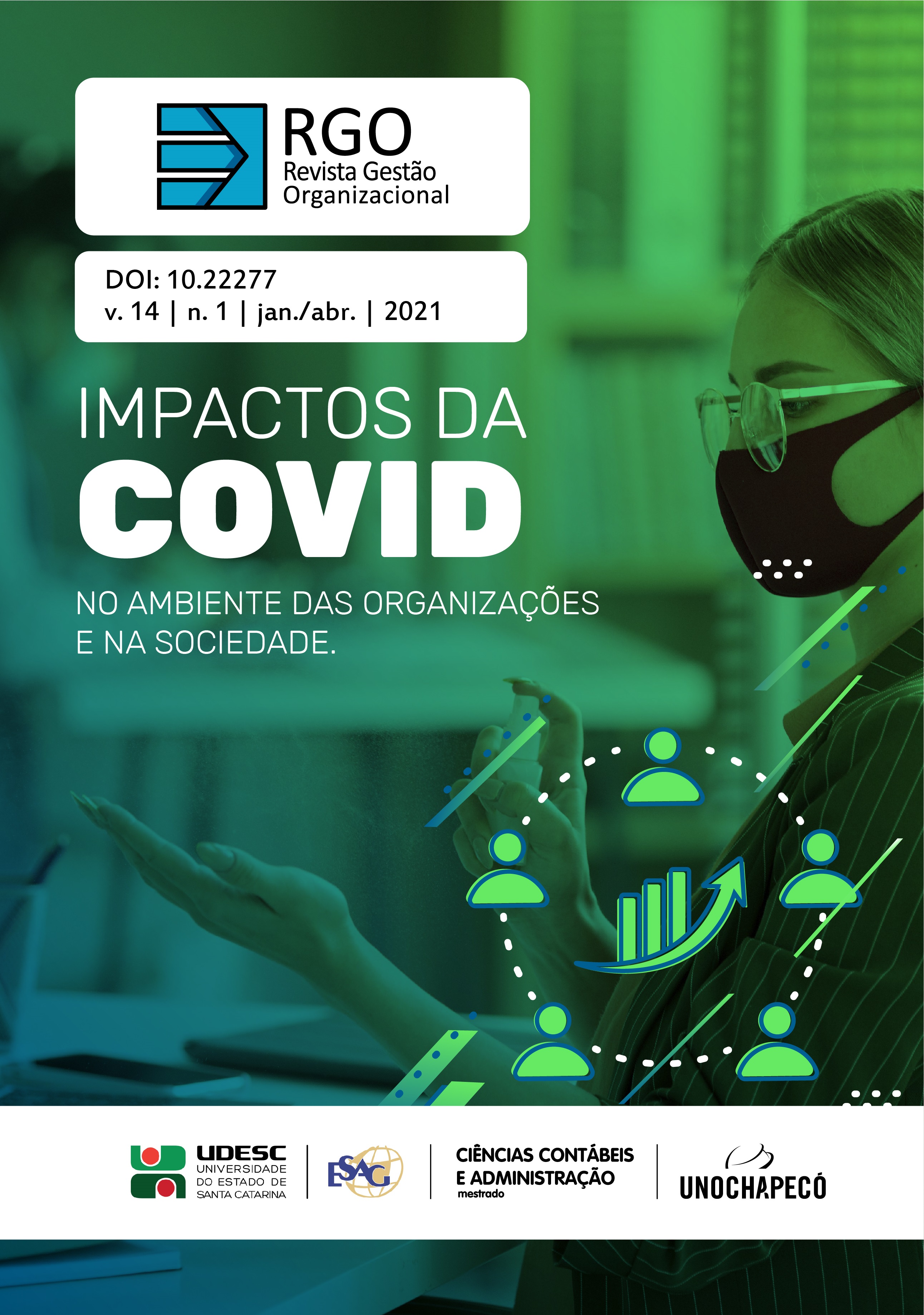INFLUÊNCIA DAS CARACTERÍSTICAS DOS PAÍSES NA DISSEMINAÇÃO DA COVID-19
DOI:
https://doi.org/10.22277/rgo.v14i1.5715Palavras-chave:
Covid-19., Coronavírus, Fatores Culturais, Fatores sociais.Resumo
A expansão da pandemia COVID-19 desestruturou o cenário econômico mundial, se alastrou rapidamente causando mortes e modificando as relações sociais. O estudo tem por objetivo analisar os fatores sociais, econômicos, demográficos e culturais que influenciam na propagação da COVID-19 e mortalidade das pessoas em âmbito internacional. A análise dos dados de 110 países ocorreu pelo uso das técnicas de estatística descritiva e regressão linear múltipla. Os resultados apontam que as variáveis determinantes da COVID-19 (casos confirmados, mortes, recuperados, índice de contaminação e índice de mortalidade) podem ser explicadas, isoladamente, tanto por fatores sociais, econômicos e demográficos, quanto pelo comportamento característico da cultura de cada nação. Constatou-se números de casos maiores em países mais corruptos, com maior índice de desemprego, maior tamanho demográfico, maior PIB e com culturas predominantemente individualistas e masculinas. O número de mortes foi mais constatado em países mais corruptos, populosos, com PIB mais elevado e com cultura individualista. Por sua vez, o número de recuperados foi mais consistente em países com poder econômico mais elevado e cultura de aversão a incerteza.
Downloads
Referências
ANDERSON, R. M.; HEESTERBEEK, H.; KLINKENBERG; D.; HOLLINGSWORTH, T. D. How will country-based mitigation measures influence the course of the COVID-19 epidemic? The Lancet, v. 395, n. 10228, p. 931-934, 2020. DOI: 10.1016/S0140-6736(20)30567-5
AVENI, A. Estratégias pelo trabalho no futuro devido a pandemia Covid-19. Revista Processus de Políticas Públicas e Desenvolvimento Social, v. 2, n. 3, p. 04-14, 2020.
BHUSAL, M. K. The World After COVID-19: An opportunity for a new beginning. International Journal of Scientific and Research Publications, v. 10, n. 5, p. 735-741, 2020. DOI: 10.29322/IJSRP.10.05.2020. p10185.
CECCHETTI, S.; MOHANTY, M.; ZAMPOLLI, F. The real effects of debt. BIS Working Papers: Bank for International Settlements. 2011.
CHANG, L. C. An examination of cross-cultural negotiation: Using Hofstede framework. Journal of American Academy of Business, v. 2, n. 2, p. 567-570, 2003.
CIA - CENTRAL INTELLIGENCE AGENCY. The Word Factbook. Disponível em https://www.cia.gov/library/publications/the-world-factbook/rankorder/2147rank.html. Acesso em: 20 jun. 2020.
CEPAL - Comissão Econômica para a América Latina e o Caribe. América Latina y el Caribe ante la pandemia del COVID-19: efectos económicos y sociales. 2020.
ELSLAND, S. L. V., O'HARE, R. Coronavirus pandemic could have caused 40 million deaths if left unchecked. Disponível em : https://www.imperial.ac.uk/news/196496/coronavirus-pandemic-could-have-caused-40/. Acesso em: 30 jun. 2020.
FEREIRA JUNIOR, R. R.; RITA, L. P. S. Impactos da Covid-19 na Economia: limites, desafios e políticas. Revista Teste, v. 1, n. 7, p. 35-47, 2016.
FREY, C. B.; CHEN, C.; PRESIDENTE, G. Democracy, Culture, and Contagion: Political Regimes and Countries Responsiveness to Covid-19. Covid Economics, v. 18, p. 1-20, 2020.
GAMA NETO, R. B. Impactos da Covid-19 sobre a economia mundial. Boletim de Conjuntura (BOCA), v. 2, n. 5, p. 113-127, 2020.
GELFAND, M.; JACKSON, J. C.; PAN, X.; NAU, D.; DAGHER, M. M.; VAN LANGE, P.; CHIU, C. The importance of cultural tightness and government efficiency for understanding COVID-19 growth and death rates. Psyarxiv, 2020. Doi: 10.31234/osf. io/m7f8a.
GORODNICHENKO, Y.; ROLAND, G. Culture, institutions, and the wealth of nations. Review of Economics and Statistics, v. 99, n. 3, p. 402-416, 2017. DOI: 10.1162/REST_a_00599
HOFSTEDE, G. Dimensionalizing cultures: The Hofstede model in context. Online readings in psychology and culture, v. 2, n. 1, p. 1-26, 2011. DOI: 10.9707/2307-0919.1014.
HOFSTEDE INSIGHTS. Compare countries. Disponível em: https://www.hofstede-insights.com/. Acesso em: 25 maio 2020.
HUYNH, T. L. D. Does culture matter social distancing under the COVID-19 pandemic? Safety Science, p. 104872, 2020.
INTERNATIONAL MONETARY FUND. Gross domestic product, current prices. Disponível em: https://www.imf.org/external/error.htm?URL=http://www.imf.org/external/pubs/ft/weo/2018. Acesso em 20 mai. 2020.
KRAEMER, M. U.; YANG, C-H.; GUTIERREZ, B.; WU; C-H.; KLEIN, B.; PIGOTT, D. M. The effect of human mobility and control measures on the COVID-19 epidemic in China. Science, v. 368, n. 6490, p. 493-497, 2020. DOI: 10.1126/science.abb4218.
KUMAR, M.; WOO, J. Public debt and growth. IMF working papers: International Monetary Fund. p. 1-47, 2010.
LAING, T. The economic impact of the Coronavirus 2019 (Covid-2019): Implications for the mining industry. The Extractive Industries and Society, 2020. DOI: 10.1016/j.exis.2020.04.003.
LANCKER, W. V; PAROLIN, Z. COVID-19, school closures, and child poverty: a social crisis in the making. The Lancet Public Health, 2020. DOI: 10.1016/S2468-2667(20)30084-0.
LEMOS, P.; ALMEIDA-FILHO, N.; FIRMO, J. COVID-19, desastre do sistema de saúde no presente e tragédia da economia em um futuro bem próximo. Brazilian Journal of Implantology and Health Sciences, v. 2, n. 4, p. 39-50, 2020. DOI: 10.36557/2674-8169.2020v2n4p39-50.
MARANHÃO, R., A.; SENHORAS, E. M. Pacote econômico governamental e o papel do BNDES na guerra contra o novo coronavírus. Boletim de Conjuntura (BOCA), v. 2, n. 4, p. 27-39, 2020.
MORROW, G.; ROTHWELL, C.; BURFORD, B.; ILLING, J. Cultural dimensions in the transition of overseas medical graduates to the UK workplace. Medical Teacher, v. 35, n. 10, p. 1537-e1545, 2013. DOI: 10.3109/0142159X.2013.802298.
MURSHED, S. M. Capitalism and COVID-19: Crisis at the Crossroads. Peace Economics, Peace Science and Public Policy, v. 1, p. 1-8, 2020. DOI: 10.1515/peps-2020-0026.
NAÇÕES UNIDAS BRASIL. OIT: quase 25 milhões de empregos podem ser perdidos no mundo devido à COVID-19. Disponivel em: <https://nacoesunidas.org/oit-quase-25-milhoes-de-empregos-podem-ser-perdidos-no-mundo-devido-a-covid-19/>. Acesso em: 20 jun. 2020.
NICOLA, M., ALSAFI, Z.; SOHRABI, C.; KERWAN, A.; AL-JABIR, A.; IOSIFIDIS, C.; AGHA, M.; AGHA, R. The socio-economic implications of the coronavirus pandemic (COVID-19): A review. International Journal of Surgery (London, England), v. 78, p. 185, 2020. DOI: 10.1016/j.ijsu.2020.04.018.
OMS - ORGANIZAÇÃO MUNDIAL DA SAÚDE. Coronavirus disease (COVID-2019) situation reports. Disponível em: https://www.who.int. Acesso em: 26 jun. 2020
OPAS - ORGANIZAÇÃO PAN-AMERICANA DA SAÚDE. Folha informativa – COVID-19 (doença causada pelo novo coronavírus). Disponível em: https://www.paho.org. Acesso em: 27 jun. 2020
PNUD - PROGRAMA DAS NAÇÕES UNIDAS PARA O DESENVOLVIMENTO. Ranking IDH Global 2014. Disponível em: https://www.br.undp.org/content/brazil/pt/home/idh0/rankings/idh-global.html. Acesso em 20 mai. 2020.
REINHART, C. M.; ROGOFF, K. S. Growth in a time of debt. American Economic Review, v. 100, n. 2, p. 573-78, 2010. DOI: https://doi.org/10.3386/w15639.
SIEGEL, J. I.; LICHT, A. N.; SCHWARTZ, S. H. Egalitarianism and international investment. Journal of Financial Economics, v. 102, n. 3, p. 621-642, 2011. DOI: 10.1016/j.jfineco.2011.05.010.
SOUZA, D. O. The COVID-19 pandemic beyond Health Sciences: reflections on its social determination. Ciência & Saúde Coletiva, v. 25, p. 2469-2477, 2020. DOI: 10.1590/1413-81232020256.1.11532020.
SUMNER, A; HOY, C.; ORTIZ-JUAREZ, E. Estimates of the impact of COVID-19 on Global Poverty. UNU-WIDER, April, p. 800-9, 2020.
THE WORLD BANK. Understanding the Coronavirus (COVID-19) pandemic through data. Disponível em: http://datatopics.worldbank.org/universal-health-coverage/coronavirus/. Acesso em 20 jun. 2020.
TRADING ECONOMICS. Taxa de Desemprego - Lista de Países. Disponível em: https://pt.tradingeconomics.com/country-list/unemployment-rate. Acesso em 20 mai. 2020.
TRANSPARÊNCIA INTERNACIONAL BRASIL. Índice de Percepção da Corrupção 2019. Disponível em: https://transparenciainternacional.org.br/ipc/. Acesso em 20 mai. 2020.
TROMPENAARS, F. Nas ondas da cultura: como entender a diversidade cultural nos negócios. São Paulo: Educator, p. 13-28, 1994.
WALKER P. G. et al. The global impact of COVID-19 and strategies for mitigation and suppression. WHO Collaborating Centre for Infectious Disease Modelling, MRC Centre for Global Infectious Disease Analysis, Abdul Latif Jameel Institute for Disease and Emergency Analytics, Imperial College London. 2020. DOI: https://doi.org/10.25561/77735.
Downloads
Publicado
Como Citar
Edição
Seção
Licença
Estou ciente de que, em sendo aprovado, a publicação do artigo será no formato on-line na RGO.
Também tenho ciência de que há autorização para assumir contratos adicionais separadamente, para distribuição não-exclusiva da versão do trabalho publicada nesta revista (ex.: publicar em repositório institucional ou como capítulo de livro), com reconhecimento de autoria e publicação inicial nesta revista.
Do ponto de vista do Creative Commons, a Revista Gestão Organizacional é de acesso aberto e irrestrito, porém não permitindo adaptações nos artigos, nem o uso comercial.
Sobre a licença Creative Commons: As licenças e instrumentos de direito de autor e de direitos conexos da Creative Commons forjam um equilíbrio no seio do ambiente tradicional “todos os direitos reservados” criado pelas legislações de direito de autor e de direitos conexos. Os nossos instrumentos fornecem a todos, desde criadores individuais até grandes empresas, uma forma padronizada de atribuir autorizações de direito de autor e de direitos conexos aos seus trabalhos criativos. Em conjunto, estes instrumentos e os seus utilizadores formam um corpo vasto e em crescimento de bens comuns digitais, um repositório de conteúdos que podem ser copiados, distribuídos, editados, remixados e utilizados para criar outros trabalhos, sempre dentro dos limites da legislação de direito de autor e de direitos conexos.
A Revista Gestão Organizacional adota o sistema: Atribuição-SemDerivações-SemDerivados CC BY-NC-ND: Permite o download dos seus trabalhos e o compartilhemento desde que atribuam crédito, mas sem que possam alterá-los de nenhuma forma ou utilizá-los para fins comerciais.























